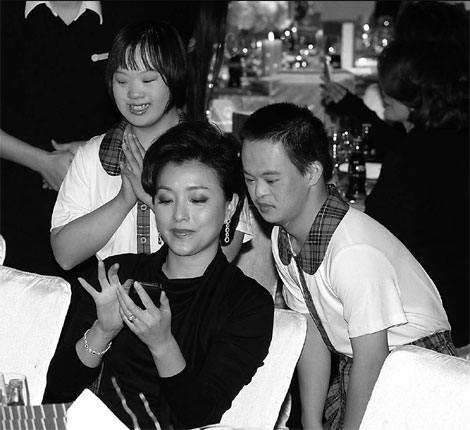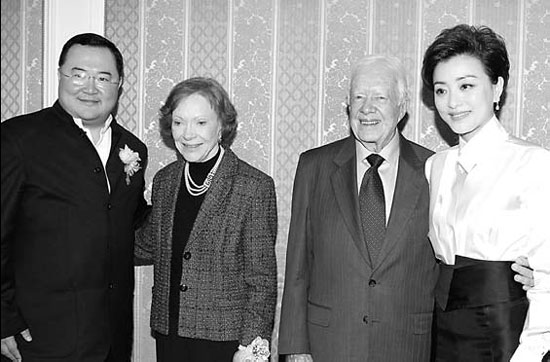Yang Lan's joy of giving
 0 Comment(s)
0 Comment(s) Print
Print E-mail China Daily, December 19, 2012
E-mail China Daily, December 19, 2012
 |
|
Yang Lan at a recent charity auction for the International Special Olympics in Shanghai. China Photo Press |
A luminous charity ball is just the brighter side of Yang Lan's non-profit work. There's hard work and sweat behind all that glitter.
Yang Lan is getting ready for a ball at a five-star hotel in Beijing, which was gearing up to welcome more than 200 celebrities. The 44-year-old TV host, one of the country's most famous faces and dubbed China's answer to Oprah Winfrey, emerges dressed in a red skirt suit and followed by cameras.
But Yang says she wants to show off something more: Giving back is glorious.
"I feel more real while doing charity work than when I walk on the red carpet," says Yang. "Especially when I see people whose lives have been changed in a positive way because of me. I feel much more self-contented."
The object of the ball is the Sun Art Classroom, a new charity project which will be launched in 2013 by Sun Culture Foundation. The nonprofit was started by Yang and her husband Wu Zheng, or Bruno, in 2005 with the aim of promoting a philanthropic culture in China.
Under the scheme, children of migrant families in Beijing will take art classes, including music, dance and painting.
Yang's foundation has been focusing on these children for years. What prompted her to develop a formal project for migrant children was a boy from a juvenile reformatory in Beijing whom she met five years ago.
Back in 2007, Yang invited dancers and teachers from the National Ballet of China to teach students how to dance. The goal was to put on an original ballet jointly performed by professional dancers and students of the reformatory.
The boy was sent to the reformatory because of a violent attack. He was very rebellious and resistant to the ballet classes.
But, as weeks passed, the boy came to the class and danced with others.
"One day he gave me a rose and smiled, saying that he had been selected as the male lead in the finale show," recalls Yang. "From that moment, I realized the power of art."
Then Yang invited artists to start more music courses, such as guitar and harmonica, for migrant students. She and her team also brought the students to watch performances at venues like Capital Theater and the National Center for the Performing Arts.
She admits she once had doubts about the project. "Did those students need those courses more than financial help?" she asked herself. But as time goes by, she has become more determined.
According to Gao Guangshen, vice-secretary-general of the Sun Culture Foundation, there is a large number of primary school students in Beijing who are non-Beijing natives.
"Many children of migrant families feel uncomfortable in Beijing, which is a totally strange environment for them," says Gao. "Connecting with art could make them more confident and happier"
Wu Tao, 17, whose parents sell vegetables at a small market, is one of the migrant students taking guitar courses arranged by the foundation. Living near a railway line, Wu has been living with the noise for years, though he likes playing guitar and is one of the best students in the class.
Now he works in a restaurant washing dishes. He tells Yang his dream is to become a cook - a cook who can play the guitar.
"My life is good and I have great education. Being with those children makes me sober and moves me," Yang says.
Her aim is to develop the Sun Art Classroom project in Beijing and then in other cities in three years.
Each classroom needs 120,000 yuan ($19,000) for a year, including facilities and teachers. Four migrant schools in Beijing have started the program, which invites retired art teachers to give classes.
Yang's next target will be the "left-behind" children, with one or both parents working far away from home, leaving them at home to be taken care of by grandparents or other relatives.
"These social problems are brought by the fast urbanization," Yang says. "I wake up in the morning as a mother and I watch news like everybody else. I want to be a part of the world in a positive way."
Yang's own life reflects China's transformation and rapid development. Her grandmother grew up at a time when women had bound feet. Her mother became the first college student in the family.
At 21 years old, she went to an open casting call for a variety show in Beijing and beat about 1,000 other contestants when she was just a senior in college. The show became the most popular in China within the year.
In 1994, after four years of hosting a TV show, Yang realized she knew so little about the world and decided to quit her job and pursue a postgraduate degree in New York, where she met her husband.
Now, Yang is the host of two popular TV talk shows and she runs a media empire, Sun Media Group, with her husband. The couple ranks among China's richest, according to the Hurun Report, which tracks the nation's wealthiest list. In 2005, they donated half of their shares in Sun Media Investment to start their charitable foundation.
Yang says she spends a third of her time on charity work, "which is the best way to show the value of a person as a member of society".
In 2010 she co-organized a banquet in Beijing with the Bill & Melinda Gates Foundation. That brought Bill Gates and Warren Buffett together to discuss philanthropy with more than 30 of China's billionaire families.
 |
|
Yang Lan and her husband Wu Zheng with former US president Jimmy Carter and his wife Rosalynn at a recent private forum for charity experiences. Provided to China Daily |
A member of the National Committee of the Chinese People's Political Consultative Conference, Yang also proposed a law on philanthropy.
After the recent ball, at a private forum, she invited former US president Jimmy Carter and his wife Rosalynn to share their experiences working in charity - and their hopes to help China's charity develop in a sustainable way, like the economy.
"Fu erdai or guan erdai, those who inherited properties from their rich parents, are considered negative words. How do you turn fu erdai or guan erdai into ci erdai, or those who promote education and build a culture of philanthropy in China," she says. Ci erdai translates to "second generation philanthropists".
Giving to charity is growing in China, with a number of young entrepreneurs creating their own foundations, but she concedes charity still needs time to develop in the country.
"To be more respected in this world, we should show our moral dignity instead of just our spending power," she says.






Go to Forum >>0 Comment(s)